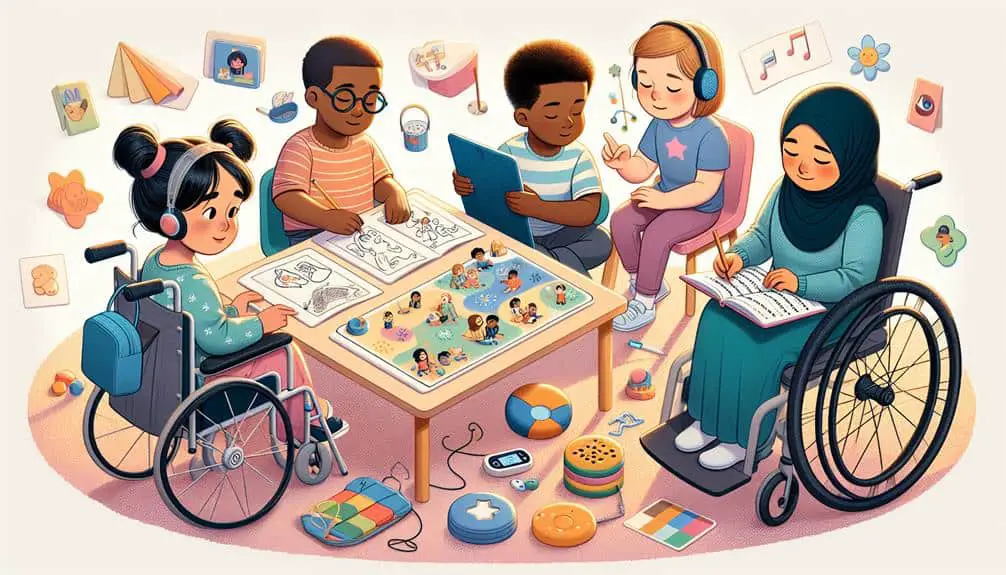Homeschooling teens brings unmatched flexibility in scheduling, personalized learning, strong family bonds, customized curriculums, and solid time management and college readiness skills. Yet, it also poses challenges in socializing, requiring careful thought.
Key Points
- Homeschooling teens offers personalized learning experiences tailored to individual academic needs.
- It fosters stronger family bonds through increased communication and shared experiences.
- Provides flexible scheduling for efficient self-paced learning and exploration of interests.
- Challenges include limited peer interaction for social development and emotional support.
- Access to socialization opportunities like group outings and clubs helps mitigate socialization concerns.
Flexibility in Scheduling
With homeschooling, teens have the advantage of exploring flexible schedules tailored to their individual learning needs and extracurricular activities. This time flexibility allows students to progress academically at their own pace, fostering a more efficient and effective learning experience. By being able to set their own study hours and work through material at a speed that suits them best, teens can investigate deeper into subjects they find challenging or breeze through topics that come more easily to them.
This self-paced, individualized learning approach not only accommodates diverse learning styles but also empowers teens to take ownership of their education.
Furthermore, the flexibility in scheduling enables students to pursue extracurricular activities such as sports, arts, or volunteering without compromising their academic progress. They can balance their educational requirements with personal interests, leading to a more well-rounded and fulfilling high school experience.
Personalized Learning Experience
Students engaged in homeschooling benefit from a highly personalized learning experience that caters to their individual academic strengths and areas for growth. This tailored instruction allows for a thorough exploration into subjects where the student excels while providing additional support where needed.
Here are three key aspects of this personalized approach:
- Individualized Growth: Homeschooling enables students to progress at their own pace, focusing on mastering concepts before moving forward. This customized learning journey fosters a sense of accomplishment and confidence in one's abilities.
- Student Engagement: With a personalized approach, students are more engaged in their learning process. They've the flexibility to explore topics that interest them, making education more enjoyable and meaningful.
- Tailored Instruction: Homeschooling allows for instruction that's tailored to a student's unique learning style. Whether visual, auditory, or kinesthetic, the curriculum can be adapted to meet the individual needs of each student, promoting a deeper understanding of the material.
Stronger Family Bonds
Enhancing family relationships is a significant benefit that often results from the homeschooling experience. By spending more time together in a homeschool setting, parents and teens have the opportunity to foster stronger bonds through increased communication and shared experiences.
Communication skills are honed as families engage in discussions, debates, and collaborative learning activities, creating an environment where everyone's voice is valued and heard.
Moreover, homeschooling can help teens develop emotional resilience through the support and understanding of their family members. The close-knit nature of homeschooling allows for open conversations about challenges, successes, and emotions, providing a safe space for teens to express themselves authentically.
This emotional support can lead to increased confidence and a deeper sense of belonging within the family unit.
Customized Curriculum Options
To cater to the diverse learning needs of homeschooled teens, the flexibility of customized curriculum options allows for a tailored educational experience that aligns with individual interests and goals. This individualized approach empowers teens to explore in-depth subjects they're passionate about while providing the necessary support in areas where they may require additional assistance.
Here are some ways in which customized curriculum options benefit homeschooling teens:
- Individualized Approach: Customized curriculums enable teens to learn at their own pace, focusing on their unique strengths and weaknesses.
- Diverse Resources: Homeschooled teens have access to a wide range of resources such as online courses, educational software, and community classes, enriching their learning experience.
- Enrichment Activities, Specialized Subjects: Teens can investigate enrichment activities like music, art, or sports alongside their core subjects, and explore specialized subjects that may not be offered in traditional schools, nurturing a well-rounded education tailored to their interests.
Socialization Concerns
You may have concerns about socializing your homeschooled teen, but it's important to remember that peer interaction can be facilitated through various avenues such as homeschool co-ops, sports teams, or community organizations.
Access to extracurricular activities can also provide opportunities for your teen to develop social skills and make friends outside the home environment.
Additionally, tapping into community support networks can offer both you and your teen a sense of belonging and connection.
Peer Interaction Importance
Considering the socialization concerns often raised about homeschooling teenagers, it's important to recognize the significance of peer interaction in their overall development. Peer interaction plays a critical role in shaping social development, fostering friendships, and building relationships.
- Social Development: Interacting with peers allows homeschooled teens to develop essential social skills such as communication, empathy, and conflict resolution. These skills are crucial for their future interactions in college, the workforce, and society.
- Friendships: Peer interaction provides homeschooled teens with the opportunity to form deep and lasting friendships. These relationships offer emotional support, companionship, and a sense of belonging, contributing significantly to their mental well-being.
- Relationships: Through peer interactions, teenagers learn to navigate various types of relationships, from casual acquaintances to close friendships. This diversity helps them understand different personalities, perspectives, and cultural backgrounds, fostering tolerance and acceptance.
Extracurricular Activities Access
Amid concerns about socialization, access to extracurricular activities is essential for homeschooled teens' overall development. Parents play an important role in ensuring their teens have opportunities to engage in a variety of activities outside the home.
Parent involvement is key in researching and facilitating access to these activities, which can range from sports teams to art classes to community service projects. By actively seeking out these opportunities, parents can help their teens cultivate diverse interests and social connections.
Participating in extracurricular activities allows homeschooled teens to interact with peers who share similar passions, fostering friendships and a sense of belonging. These activities also provide valuable learning experiences, teaching teens teamwork, time management, and leadership skills.
Additionally, involvement in extracurriculars can enhance college applications and future job prospects by demonstrating a well-rounded individual.
Community Support Networks
Access to community support networks is essential for addressing socialization concerns among homeschooled teens. When it comes to homeschooling, ensuring that your teen has opportunities to interact with peers and engage in social activities is fundamental for their development.
Here's how community support networks can help:
- Parent involvement: Community support networks often encourage parent involvement, providing a chance for parents to connect, share experiences, and organize social events for their teens.
- Resource sharing: These networks offer a platform for sharing resources like educational materials, information on social events, and tips for enhancing socialization opportunities for homeschooled teens.
- Socialization opportunities: By participating in community support networks, homeschooled teens can access a variety of socialization opportunities such as group outings, volunteer activities, and clubs, fostering friendships and interpersonal skills.
Engaging with community support networks not only addresses socialization concerns but also creates a supportive environment where both parents and teens can thrive in the homeschooling journey.
Time Management Skills
To excel in homeschooling as a teen, developing strong time management skills is essential. Task prioritization and organization are vital components of effective time management. By learning to prioritize tasks based on importance and deadlines, you can guarantee that you focus on what needs to be done first.
Organization plays a key role in keeping track of assignments, study materials, and deadlines, helping you stay on top of your homeschooling responsibilities.
Time blocking is another valuable technique that can aid in managing your time efficiently. By allocating specific time blocks for different subjects or activities, you can create a structured schedule that allows you to dedicate adequate time to each task.
Goal setting is also important in time management as it gives you a sense of direction and purpose. Setting realistic and achievable goals can help you stay motivated and focused on your homeschooling objectives.
College and Career Readiness
As you homeschool your teen, it's essential to focus on preparing them for college and future careers.
Academic preparation strategies, such as rigorous coursework and standardized testing, can help set a strong foundation.
Additionally, providing skill development opportunities through extracurricular activities and internships can enhance their readiness for the next steps.
Academic Preparation Strategies
Implementing effective academic preparation strategies is essential for homeschooled teens to guarantee they're well-equipped for college and career success. Here are some key strategies to help you excel in your academic pursuits:
- Study Habits: Developing strong study habits is critical for academic success. Create a designated study space, establish a routine, set realistic goals, and use active learning techniques like summarizing material or teaching concepts to others.
- Test Prep: Properly preparing for tests is important. Utilize resources like practice exams, study guides, and review sessions. Learn effective test-taking strategies such as time management, understanding instructions, and staying calm under pressure.
- Time Management: Efficiently managing your time is essential. Create a study schedule, prioritize tasks, avoid procrastination, and balance academics with extracurricular activities to make sure you meet deadlines and maintain a healthy work-life balance.
Skill Development Opportunities
Effective skill development opportunities are pivotal for homeschooled teens looking to enhance their college and career readiness. Critical thinking is a fundamental skill that can be nurtured through various homeschooling activities such as engaging in debates, analyzing complex texts, or solving real-world problems. By challenging teens to think critically, homeschooling provides a solid foundation for future academic and professional success.
Leadership development is another vital aspect of skill-building for homeschooled teens. Opportunities to lead group projects, organize events, or mentor younger siblings can help teens cultivate leadership qualities that are highly valued by colleges and employers. These experiences not only foster confidence and initiative but also demonstrate the ability to take charge and inspire others.
Frequently Asked Questions
How Can Homeschooling Teens Impact Their Social Skills?
Homeschooling teens can impact their social skills by actively engaging in community activities, clubs, and sports. Peer interaction fosters social development, enhancing communication skills and emotional intelligence. Balancing academic and social opportunities is key.
What Resources Are Available for Homeschooling Parents?
When homeschooling, tap into online communities and support groups for advice and camaraderie. Explore diverse curriculum options and educational materials to tailor your teen's learning experience. Remember, "It takes a village to raise a child."
Are Homeschoolers Adequately Prepared for College Admissions?
You can guarantee that homeschoolers are ready for college admissions by focusing on academic rigor and preparing for standardized tests. College readiness can also be demonstrated through portfolio assessment, showcasing a diverse range of skills and achievements.
How Can Parents Assess Their Teen's Academic Progress?
To track your teen's academic progress effectively, start by setting specific goals and regularly measuring their performance. Adjust teaching strategies as needed to guarantee growth. Stay engaged and proactive in evaluating their development.
How Do Homeschooling Teens Engage in Extracurricular Activities?
To engage in extracurricular activities while homeschooling, you must prioritize time management. Seek community involvement through local groups, sports teams, or volunteer opportunities. Balancing academics and activities fosters personal growth and social connections essential for holistic development.




